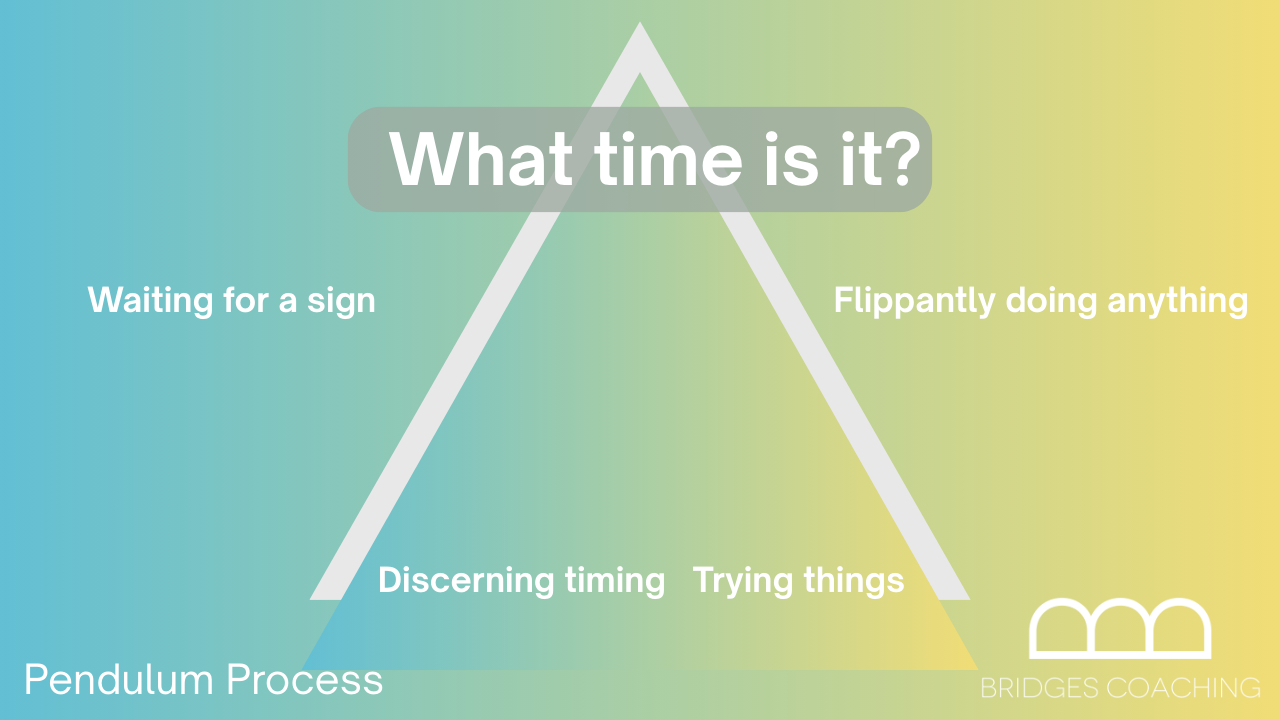3 Vital Questions to Stay On Course [Inspired by Eric Scott's message]

My husband recently shared 3 intriguing questions he highlighted in a message for a staff meeting. They sparked an insightful conversation for us and brought some clarity for where I am at personally.
He was speaking from a passage in 2 Timothy 4:6-8,
6 My life is being given as an offering to God, and the time has come for me to leave this life. 7 I have fought the good fight, I have finished the race, I have kept the faith. 8 Now, a crown is being held for me—a crown for being right with God. The Lord, the judge who judges rightly, will give the crown to me on that day—not only to me but to all those who have waited with love for him to come again.
Here are the questions Eric posed.
1. Am I in the right race?
A race implies a certain end goal. The question implores us to consider where we are headed. If we can't answer that question, it may even cause us to invest some time in an evaluation of the chapter of life we are in. (Our Destiny by Design course could help with th...
The Surprising Truth About YOUR Personal Kyptonite? [Processing Series]

Even if you are not a Superman fan, you probably know what "kryptonite" is. It's kind of his Achilles heel, he is super strong and all the things, except for when he is exposed to kryptonite.
Each of us has a kyptonite of sorts, something that steals life from us and keeps us from being as "super" as we could be. The surprising truth is that most often the thief of your being at your best is when a strength you have gets pushed too far.
Let me explain.
One of my best strengths is that I am a methodical strategist. I love planning ahead and am more comfortable living in the future rather than the present. This comes in handy as a coach. It is a value add for people I am working with when I help them build step-by-step plans and they build bridges to what could become real in their lives.
The kryptonite part comes in for me personally when I live more in the future than the present.
I'm building several bridges in this season in my life. I'm writing a book, I'm coaching a great ...
How to Halt the Madness of Over-Thinking: Processing Series

Swirling thoughts can be jsut as disruptive as negative emotions. Over-thinking has become a national passtime. We can wonder about ourselves and if we are doing the right thing(s). We can become consumed with what others are thinking about us. We can even obsess about the past and get caught up in "what if" syndrome.
Living in a state of over-concern is taxing not only on our mind, but also takes its toll on our body and on our relationships. Over-thinking robs us of living in the now because we are trying on scenarios for the future and the past instead of enjoying the moments.
Procssing over-thinking can take some mental training, but it is quite possibly one the best investments you can make with your time and energy. The ROI is worth the effort!
Whether you are the one with the over-thinking issue or you are coming alongiside someone in a coaching relationship, here are some steps you can take to help you in the process of taking back control of your thoughts when they get dem...
3 Steps to Navigating Negative Emotions: Processing Series

Life has storms - external and internal. Negative emotions are never fun, but they are important. They are like a gauge on your life dashboard alerting you to pay attention to something. Good coaching can assist with learning how to manage and mine them.
Here are some options that may help you or someone you are working with.
- Name the feeling. This is so valuable! Some times there is a general sense of malaise and starting with naming it can help you with addressing it well. Chip Dodd's book "The Voice of the heart" and his free emotional resource materials can help, but simply taking the time to identify what your gauge is saying is helpful. Are you sad, angry, lonely, fearful, hurt or something else? (This is the R- recognize part of the Coaching ROAD)
- Consider your options. It could be anything from counseling to a distracation to a release. Talking to someone usually helps reveal the next step, when you hear yourself or someone say something like, "What is need is a good cry" ...
Meet Kent: Bridges Alumni, Coach, Author and Originator

What's an originator? I'm glad you asked. (I may have made up the word.) An Originator is someone who creates original content. They have their own IP (Intellectual Property - I didn't make that one up.)
Kent originated the REST assessment and offers it for free! I would encourage you to take the assessment, but first let's hear his coach training story.
How did you first hear about coach training?
Honestly, two things were happening. First, I had been hearing about the coaching paradigm for a few years and had some respected friends who raved about it, including some friends who had trained with Bridges Coaching, and it piqued my interest. Being a voracious learner and practitioner, I get excited to learn new leadership skills. Second, I was kind of frustrated with old ministry paradigms. I wanted to see people get breakthroughs, but realized the old discipleship paradigm of “telling” doesn’t work with every personality. Additionally, had been thinking about doing coach training fo...
This Just In - Commentary On Coach Training

In the Bridges Life Coach certification course, we use a variety of adult learning techniques, and one of them is online discussion. We share different questions throughout the learning process so the trainees can interact with the material and process it by restating it, or sharing how it applies in their own life situations.
Among other things, we share about topics like why it is often hard to trust that God has a plan, what it looks like to actively listen in a real life situations, or how to ask empowering questions.
The following comment came from a list-building question requesting input on honest reasons we like to retain control. The trainee's words are in blue and italics.
I take control because apparently I know what's best for everyone!! I never knew I was such a know-it-all all when it comes to other people's lives! But it is out of concern and wanting what is best for them.
I love the honesty here! Whether we acknowledge it or not, most of us do think we know what...
What On Earth Are You Doing? (For Heavens' Sake?)

I was reading the parable of the talents recently - you know the one where the guy decides simply to hide what he was given since he knows the Master is exacting. It hit me differently this time. The Master did not give clear instructions; he just said to do something with what they were given.
So, the question may not be "What should I do?" but "What have I been given to do something with?" Food for thought about choices!
Perhaps we/I make too big a deal about hearing from the Holy Spirit to discern next steps?
Is it fear that I didn't hear clearly that holds me back?
What if God simply wants me to do something with what I have been given?
This begs the question - what have I been given?
Here are some thoughts I came up with - we have all been given certain personality traits, interests, strengths (and weaknesses), relationships, resources, intellectual capabilities, emotional awareness, and more.
And now I have choices. I can wait for a "sign" to do something, I can try thi...
Two SIMPLE Phrases That Flip The Conversation To A Coaching Mindset

There is a skill set to coaching, to be sure, but more than a skill set, coaching is a mindset.
More than following a formula, coaching* has to do with a heart posture that believes God's Spirit endwells people and is guiding each of us on our own unique journey. A good coach is a thinking partner who offers a safe space to process your pathway out loud. They are cheerleaders and sometimes mirror holders. They believe in your ability to work through whatever life has thrown at you, to do new things, to work through obstacles, and to follow through when the going gets tough.
Two super simple phrases that can be a game-changer in a coaching session or a conversation.
1) Tell me more.
Tell me more - offers the person replying to go anywhere they want to go in what they share next. In fact, they may not even know until they keep talking what they need to "get out" there to discuss.
Proverbs 20:5 says, "People’s thoughts can be like a deep well, but someone with understanding can f...
Maybe We Are Asking The Wrong Question(s)

When "stuff" happens, the go-to question for most of us is typical. "Why?"
Why did "that" happen?
Why did someone pass early? Why did that tragedy happen? Why did I lose my job? Why can't I meet someone? Why am I misunderstood?
WHY IS THIS HAPPENING!?
Job was never given a clear understanding of why he was dealt such a bad hand. Can you imagine? All your children die in one fell swoop? Your businesses fail, your stock investments tank, you are in utter familial and financial devastation, and then... then you trun up with horrid boils all over your body?
Just yuck.
Job spent some time asking some questions, and then God showed up and started asking some questions of His own. Turns out God doesn't report to us. He's not American and has His own definition of fair.
He is God, we are not. And yet He allows, even invites, us to interact with Him. To pour out our hearts. The psalms are full of this kind of dialogue.
God wants to hear from us, but He does not "report" to us. We c...
Coaching Questions to take Everyday Conversations to a Next Level

You know those regular greetings we have where you say something like, "Hey, how ya' doing?" Maybe you really want to know, but more likely you just want to say more than a simple "Hi".
Or how about the classic, "How was your day?" that you ask a spouse, or child, a friend, or family member. It's usually met with another classic, "Fine, and yours?"
Let's take some coaching concepts and build a list of questions that could take our conversations deeper, helping us to know each other more and strengthen our conversations and our relationships.
Think of a few relationships you would like to go a little deeper. Which of the following questions could work for you in different scenarios?
- Tell me about your day - what was funny or sad or weird?
- What was hard for you today?
- What was the best thing that happened today, or on vacation, or over the weekend, or ?.
- Who is someone that inspires you?
- Where did you see God at work today?
- What is something you are praying for?
- What is a ...
